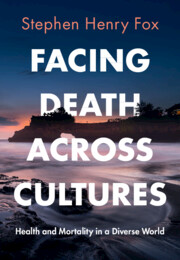Book contents
- Facing Death Across Cultures
- Facing Death Across Cultures
- Copyright page
- Dedication
- Contents
- Figures
- Tables
- Acknowledgments
- Introduction to a Cultural Species
- Module 1 The Basic Psychological Components of Culture
- Module 2 Becoming Human
- Module 3 Acculturation
- Module 4 Multicultural Adaptation
- Module 5 Health and Well-Being
- Module 6 Disease and Healing
- Module 7 Diversity and the Conventional Medical World
- Module 8 Thinking about Death
- Module 9 Managing Mortality and Difficult Passages
- Module 10 Cultures Approach the End
- Module 11 Critical and End-of-Life Care
- Module 12 Culture, Passages, and Psychosocial Supports
- Glossary
- References
- Index
Module 4 - Multicultural Adaptation
Published online by Cambridge University Press: 20 February 2025
- Facing Death Across Cultures
- Facing Death Across Cultures
- Copyright page
- Dedication
- Contents
- Figures
- Tables
- Acknowledgments
- Introduction to a Cultural Species
- Module 1 The Basic Psychological Components of Culture
- Module 2 Becoming Human
- Module 3 Acculturation
- Module 4 Multicultural Adaptation
- Module 5 Health and Well-Being
- Module 6 Disease and Healing
- Module 7 Diversity and the Conventional Medical World
- Module 8 Thinking about Death
- Module 9 Managing Mortality and Difficult Passages
- Module 10 Cultures Approach the End
- Module 11 Critical and End-of-Life Care
- Module 12 Culture, Passages, and Psychosocial Supports
- Glossary
- References
- Index
Summary
Module 4 discusses dynamics of societies when several cultures interact over sustained time periods. Multiculturalism describes a political strategy first instituted in Canada under which cultures were intended to coexist, though inequity, discrimination, and prejudice do persist around the world. Hawaiʻi and Aotearoa (New Zealand) serve as additional examples of interaction between multiple cultures. Sojourners cross cultures for work or education, expected to return home eventually, and study of their experiences has yielded concepts such as cultural intelligence to describe factors favorably influencing outcomes. Contact theory proposes that equal status interaction eventually reduces intercultural tensions, possibly benefiting diverse workforces in healthcare settings.
- Type
- Chapter
- Information
- Facing Death Across CulturesHealth and Mortality in a Diverse World, pp. 51 - 61Publisher: Cambridge University PressPrint publication year: 2025

